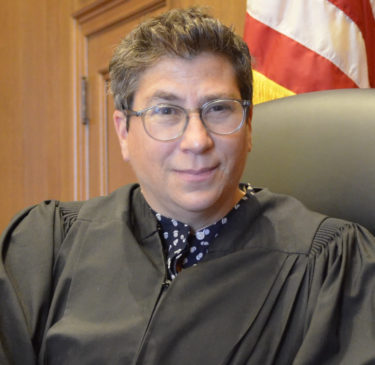NCJW supports Judge Alison Nathan. Here’s why:
Judge Alison Nathan, who has served as a judge on the United States District Court for the Southern District of New York since 2011, has had a long and distinguished legal career. After receiving her law degree from Cornell Law School in 2000, she clerked for Judge Betty Bins Fletcher on the US Court of Appeals for the Ninth Circuit and later for Associate Justice John Paul Stevens on the US Supreme Court. She worked as a practicing attorney for the law firm Wilmer, Cutler, Pickering, Hale, and Dorr from 2002 until 2006 before becoming a law professor at Fordham University School of Law and, later, a law professor at the New York University School of Law. From 2009 to 2010, Judge Nathan worked as Special Assistant to the President and Associate White House Counsel during the Barack Obama administration. If confirmed, she would be only the second openly LGBTQ+ woman to serve on a US Court of Appeals.
Judge Alison Nathan’s stance on important issues:
Civil Rights:
As a district court judge, Judge Nathan has made key rulings that protect civil rights. In Common Cause/New York v. Brehm, Judge Nathan ruled that New York’s practice of moving voters from active status to inactive status violated the Equal Protection Clause and disenfranchised voters. In Medina v. City of New York, Judge Nathan found that the New York Police Department was using excessive force during arrests, and in E.G. v. City of New York, she found that New York City was not providing adequate access to the internet in homeless shelters, thus disproportionately affecting homeless students who needed access to online education tools during the COVID pandemic.
Immigration:
Judge Nathan has helped ensure the protection of due process for all individuals in immigration cases. In Vasquez Perez v. Decker, she ruled that Immigration and Customs Enforcement (ICE) and the Department of Homeland Security were unconstitutionally jailing immigrants in New York for months before bringing them in front of a judge. Judge Nathan ultimately ruled that all detained immigrants must receive a hearing in front of a judge within 10 days of being arrested. This ruling, which was the first of its kind establishing standards to curb ICE’s practice of prolonged detentions, followed long-standing precedent that immigrants are entitled to the same constitutional protections as everyone else.
Criminal Justice:
Judge Nathan has adjudicated a significant number of criminal cases during her time on the bench and has impartially and fairly applied the law while protecting the rights of defendants under the Constitution in each one. In United States v. Scparta, Judge Nathan ruled that a Bureau of Prisons rule that prisoners must quarantine together before being released to home confinement as a result of the COVID pandemic was inconsistent with a direct order from the Attorney General because it did not test any of the prisoners before quarentining them and, if anyone in the group did contract COVID, the quarantine period would reset for every individual, putting elderly and medically vulnerable incarcerated people at an increased risk.
Judge Alison Nathan’s experience and education:
Experience:
Judge Nathan has had a long and distinguished legal career. She served as a law clerk for both Judge Betty Bins Fletcher on the US Court of Appeals for the Ninth Circuit as well for Associate Justice John Paul Stevens on the US Supreme Court. She also worked for the law firm Wilmer, Cutler, Pickering, Hale, and Dorr from 2002 until 2006 before becoming a law professor at Fordham University School of Law. In 2008, she became the Fritz Alexander Fellow for New York University School of Law where she taught law as part of the fellowship. From 2009 to 2010, Judge Nathan worked as Special Assistant to the President and Associate White House Counsel during the Barack Obama administration before her appointment as a judge to the US District Court for the Southern District of New York.
Education and Recognitions:
Judge Nathan received her JD, magna cum laude and Order of the Coif, from Cornell Law School and her BA from Cornell University. When working in private practice, Judge Nathan devoted substantial time to pro bono representations and received WilmerHale’s Pro Bono Award in 2003, 2004, and 2005. She is a member of several bar associations as well as the Federal Bar Council Inn of Court, the Second Circuit Federal Bar Council, and the American Law Institute. In 2015, she received the Community Service Award from Fordham OUTlaws, an LGBTQ+ law student organization. In her current position as US District Court Judge for the Southern District of New York, Judge Nathan serves on the Bench and Bar Fund Committee, COVID Response Team, Grievance Committee, and as Chair of the Security Committee.
